A Report on Organisational Behaviour in BBC: Culture, Power & Teams
VerifiedAdded on 2020/06/04
|18
|5205
|55
Report
AI Summary
This report provides an in-depth analysis of the organisational behaviour within the BBC. It begins by examining the historical organisational culture of BBC, using Handy's model to identify its initial 'task culture' and the influence of power dynamics and politics. The report then delves into how culture, power, and politics affect employee behaviour, highlighting the impact of positive and negative power structures, and the importance of a fair and cooperative political climate. It further explores content and process theories of motivation, including Maslow's Hierarchy of Needs, ERG theory, Equity theory, and Expectancy theory, and their application in enhancing team effectiveness. The report also addresses various motivational techniques and their contribution to achieving organisational goals, identifies different team types within BBC, and suggests methods for creating effective teams. Finally, it discusses processes for improving team performance, productivity and identifies barriers to effective performance, concluding with recommendations for fostering a positive and productive work environment within the BBC.
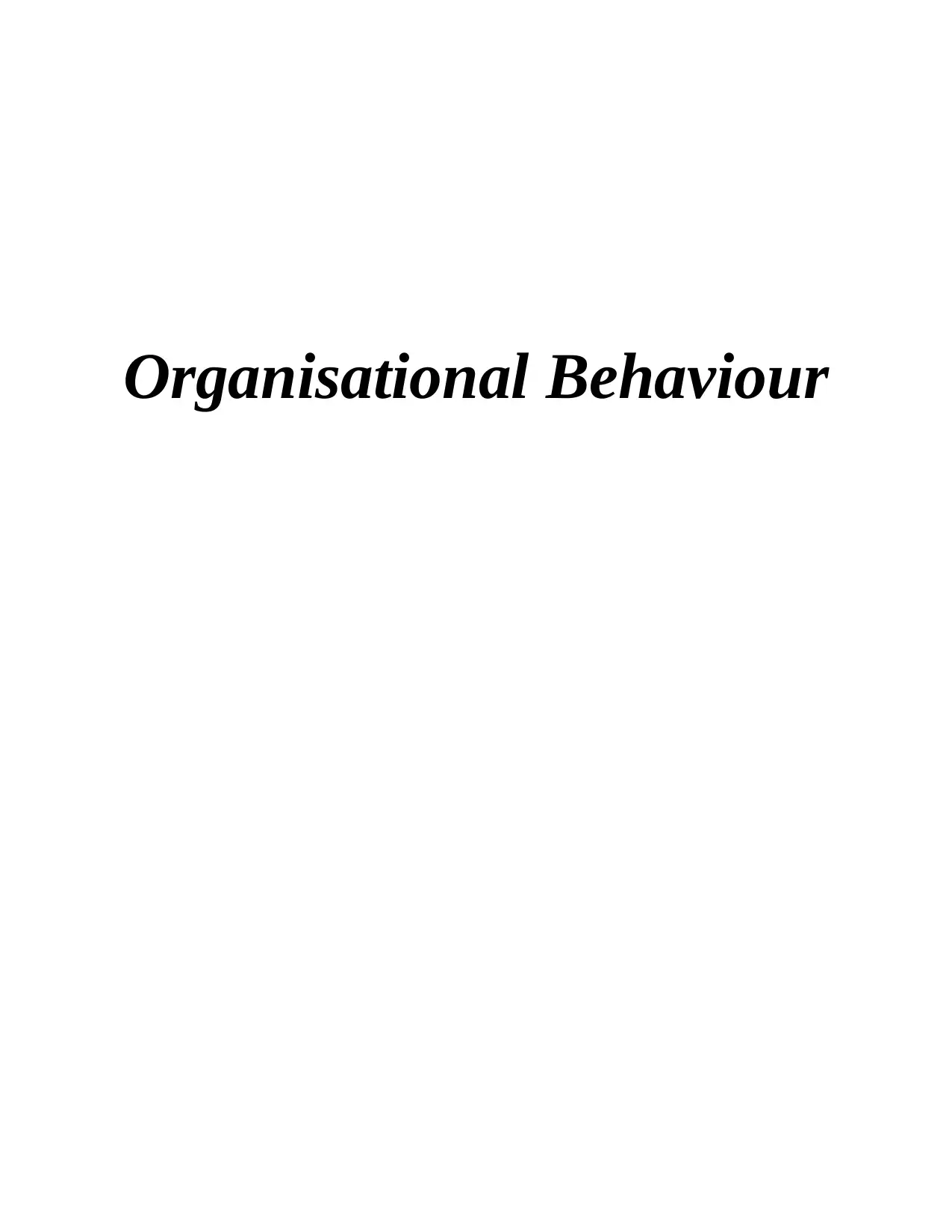
Organisational Behaviour
Paraphrase This Document
Need a fresh take? Get an instant paraphrase of this document with our AI Paraphraser
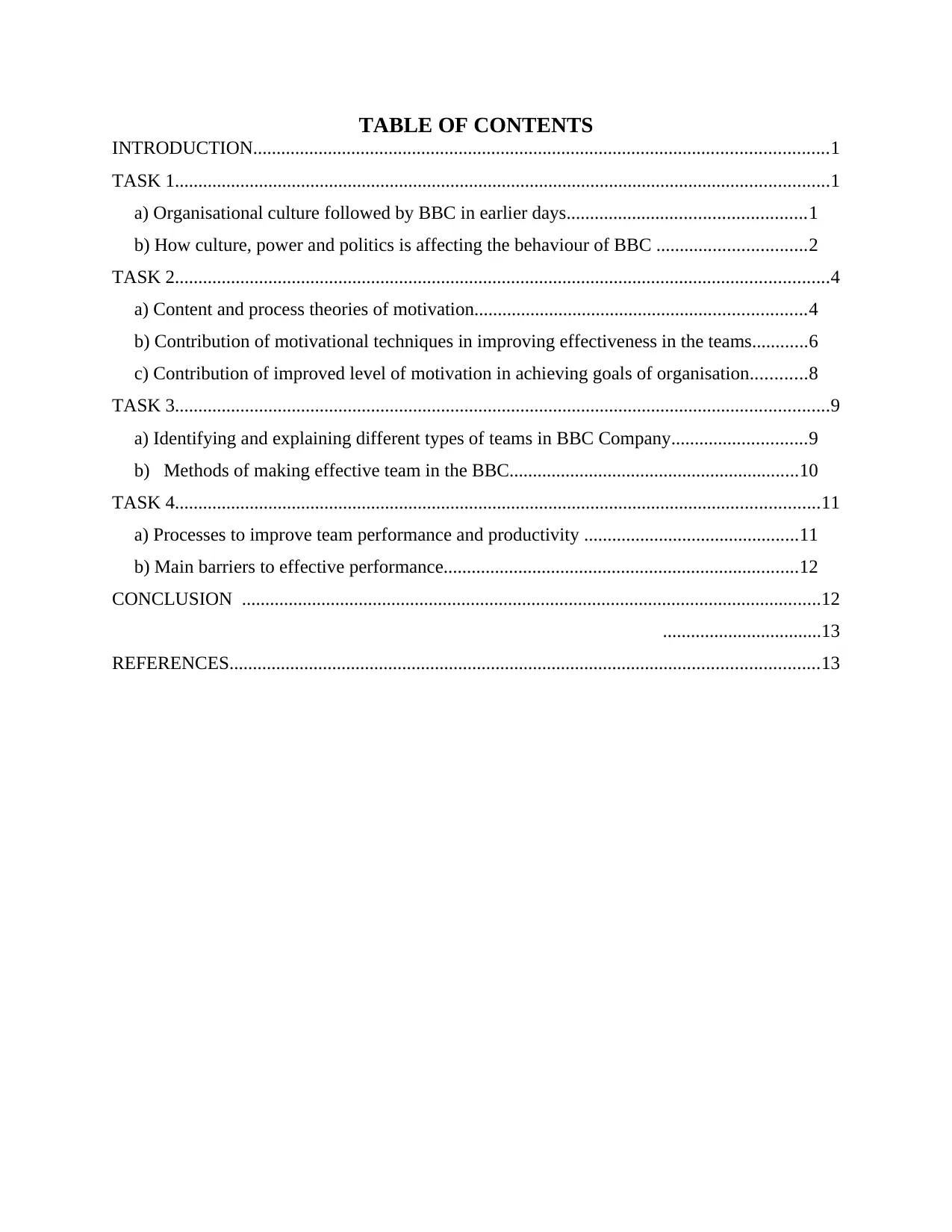
TABLE OF CONTENTS
INTRODUCTION...........................................................................................................................1
TASK 1............................................................................................................................................1
a) Organisational culture followed by BBC in earlier days...................................................1
b) How culture, power and politics is affecting the behaviour of BBC ................................2
TASK 2............................................................................................................................................4
a) Content and process theories of motivation.......................................................................4
b) Contribution of motivational techniques in improving effectiveness in the teams............6
c) Contribution of improved level of motivation in achieving goals of organisation............8
TASK 3............................................................................................................................................9
a) Identifying and explaining different types of teams in BBC Company.............................9
b) Methods of making effective team in the BBC..............................................................10
TASK 4..........................................................................................................................................11
a) Processes to improve team performance and productivity ..............................................11
b) Main barriers to effective performance............................................................................12
CONCLUSION ............................................................................................................................12
..................................13
REFERENCES..............................................................................................................................13
INTRODUCTION...........................................................................................................................1
TASK 1............................................................................................................................................1
a) Organisational culture followed by BBC in earlier days...................................................1
b) How culture, power and politics is affecting the behaviour of BBC ................................2
TASK 2............................................................................................................................................4
a) Content and process theories of motivation.......................................................................4
b) Contribution of motivational techniques in improving effectiveness in the teams............6
c) Contribution of improved level of motivation in achieving goals of organisation............8
TASK 3............................................................................................................................................9
a) Identifying and explaining different types of teams in BBC Company.............................9
b) Methods of making effective team in the BBC..............................................................10
TASK 4..........................................................................................................................................11
a) Processes to improve team performance and productivity ..............................................11
b) Main barriers to effective performance............................................................................12
CONCLUSION ............................................................................................................................12
..................................13
REFERENCES..............................................................................................................................13

⊘ This is a preview!⊘
Do you want full access?
Subscribe today to unlock all pages.

Trusted by 1+ million students worldwide
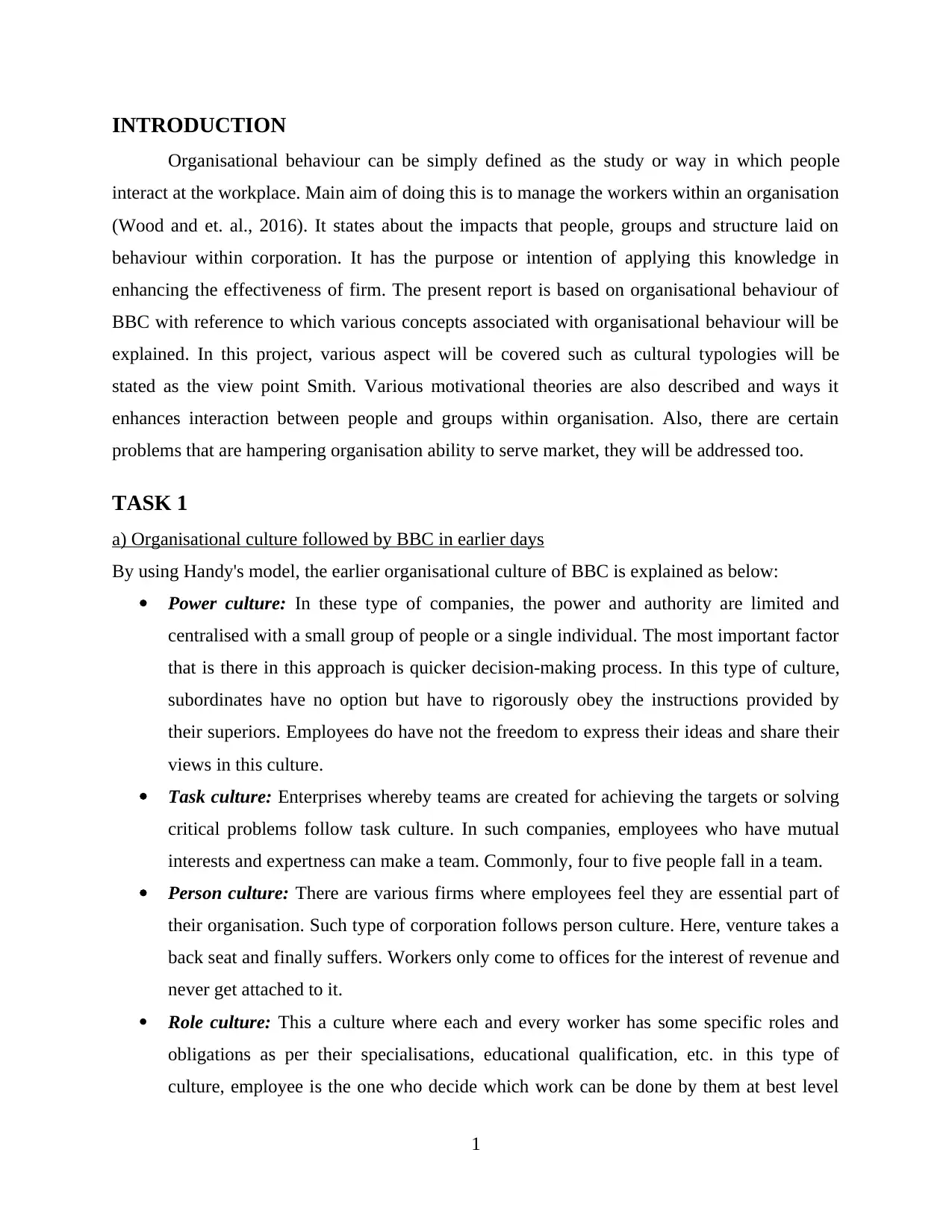
INTRODUCTION
Organisational behaviour can be simply defined as the study or way in which people
interact at the workplace. Main aim of doing this is to manage the workers within an organisation
(Wood and et. al., 2016). It states about the impacts that people, groups and structure laid on
behaviour within corporation. It has the purpose or intention of applying this knowledge in
enhancing the effectiveness of firm. The present report is based on organisational behaviour of
BBC with reference to which various concepts associated with organisational behaviour will be
explained. In this project, various aspect will be covered such as cultural typologies will be
stated as the view point Smith. Various motivational theories are also described and ways it
enhances interaction between people and groups within organisation. Also, there are certain
problems that are hampering organisation ability to serve market, they will be addressed too.
TASK 1
a) Organisational culture followed by BBC in earlier days
By using Handy's model, the earlier organisational culture of BBC is explained as below:
Power culture: In these type of companies, the power and authority are limited and
centralised with a small group of people or a single individual. The most important factor
that is there in this approach is quicker decision-making process. In this type of culture,
subordinates have no option but have to rigorously obey the instructions provided by
their superiors. Employees do have not the freedom to express their ideas and share their
views in this culture.
Task culture: Enterprises whereby teams are created for achieving the targets or solving
critical problems follow task culture. In such companies, employees who have mutual
interests and expertness can make a team. Commonly, four to five people fall in a team.
Person culture: There are various firms where employees feel they are essential part of
their organisation. Such type of corporation follows person culture. Here, venture takes a
back seat and finally suffers. Workers only come to offices for the interest of revenue and
never get attached to it.
Role culture: This a culture where each and every worker has some specific roles and
obligations as per their specialisations, educational qualification, etc. in this type of
culture, employee is the one who decide which work can be done by them at best level
1
Organisational behaviour can be simply defined as the study or way in which people
interact at the workplace. Main aim of doing this is to manage the workers within an organisation
(Wood and et. al., 2016). It states about the impacts that people, groups and structure laid on
behaviour within corporation. It has the purpose or intention of applying this knowledge in
enhancing the effectiveness of firm. The present report is based on organisational behaviour of
BBC with reference to which various concepts associated with organisational behaviour will be
explained. In this project, various aspect will be covered such as cultural typologies will be
stated as the view point Smith. Various motivational theories are also described and ways it
enhances interaction between people and groups within organisation. Also, there are certain
problems that are hampering organisation ability to serve market, they will be addressed too.
TASK 1
a) Organisational culture followed by BBC in earlier days
By using Handy's model, the earlier organisational culture of BBC is explained as below:
Power culture: In these type of companies, the power and authority are limited and
centralised with a small group of people or a single individual. The most important factor
that is there in this approach is quicker decision-making process. In this type of culture,
subordinates have no option but have to rigorously obey the instructions provided by
their superiors. Employees do have not the freedom to express their ideas and share their
views in this culture.
Task culture: Enterprises whereby teams are created for achieving the targets or solving
critical problems follow task culture. In such companies, employees who have mutual
interests and expertness can make a team. Commonly, four to five people fall in a team.
Person culture: There are various firms where employees feel they are essential part of
their organisation. Such type of corporation follows person culture. Here, venture takes a
back seat and finally suffers. Workers only come to offices for the interest of revenue and
never get attached to it.
Role culture: This a culture where each and every worker has some specific roles and
obligations as per their specialisations, educational qualification, etc. in this type of
culture, employee is the one who decide which work can be done by them at best level
1
Paraphrase This Document
Need a fresh take? Get an instant paraphrase of this document with our AI Paraphraser
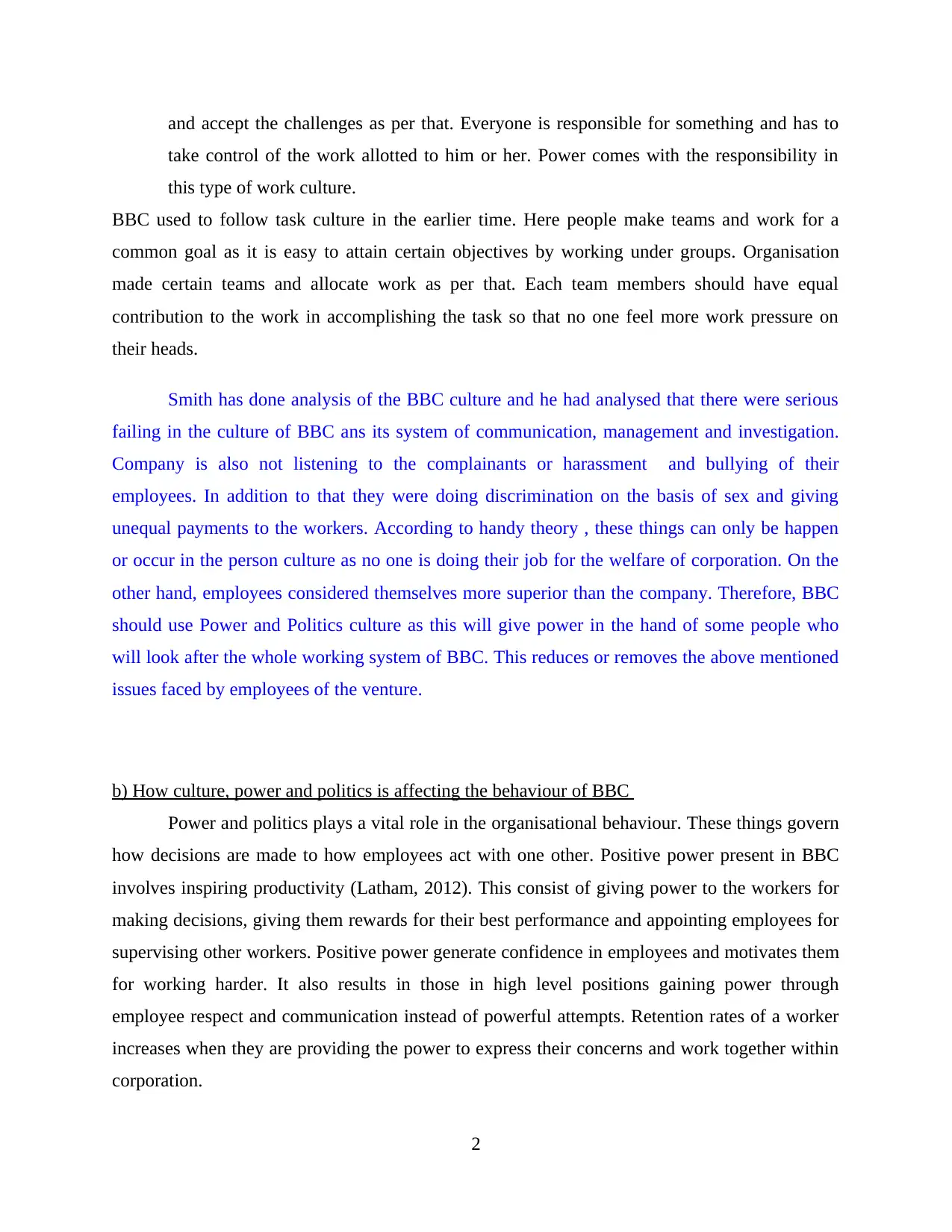
and accept the challenges as per that. Everyone is responsible for something and has to
take control of the work allotted to him or her. Power comes with the responsibility in
this type of work culture.
BBC used to follow task culture in the earlier time. Here people make teams and work for a
common goal as it is easy to attain certain objectives by working under groups. Organisation
made certain teams and allocate work as per that. Each team members should have equal
contribution to the work in accomplishing the task so that no one feel more work pressure on
their heads.
Smith has done analysis of the BBC culture and he had analysed that there were serious
failing in the culture of BBC ans its system of communication, management and investigation.
Company is also not listening to the complainants or harassment and bullying of their
employees. In addition to that they were doing discrimination on the basis of sex and giving
unequal payments to the workers. According to handy theory , these things can only be happen
or occur in the person culture as no one is doing their job for the welfare of corporation. On the
other hand, employees considered themselves more superior than the company. Therefore, BBC
should use Power and Politics culture as this will give power in the hand of some people who
will look after the whole working system of BBC. This reduces or removes the above mentioned
issues faced by employees of the venture.
b) How culture, power and politics is affecting the behaviour of BBC
Power and politics plays a vital role in the organisational behaviour. These things govern
how decisions are made to how employees act with one other. Positive power present in BBC
involves inspiring productivity (Latham, 2012). This consist of giving power to the workers for
making decisions, giving them rewards for their best performance and appointing employees for
supervising other workers. Positive power generate confidence in employees and motivates them
for working harder. It also results in those in high level positions gaining power through
employee respect and communication instead of powerful attempts. Retention rates of a worker
increases when they are providing the power to express their concerns and work together within
corporation.
2
take control of the work allotted to him or her. Power comes with the responsibility in
this type of work culture.
BBC used to follow task culture in the earlier time. Here people make teams and work for a
common goal as it is easy to attain certain objectives by working under groups. Organisation
made certain teams and allocate work as per that. Each team members should have equal
contribution to the work in accomplishing the task so that no one feel more work pressure on
their heads.
Smith has done analysis of the BBC culture and he had analysed that there were serious
failing in the culture of BBC ans its system of communication, management and investigation.
Company is also not listening to the complainants or harassment and bullying of their
employees. In addition to that they were doing discrimination on the basis of sex and giving
unequal payments to the workers. According to handy theory , these things can only be happen
or occur in the person culture as no one is doing their job for the welfare of corporation. On the
other hand, employees considered themselves more superior than the company. Therefore, BBC
should use Power and Politics culture as this will give power in the hand of some people who
will look after the whole working system of BBC. This reduces or removes the above mentioned
issues faced by employees of the venture.
b) How culture, power and politics is affecting the behaviour of BBC
Power and politics plays a vital role in the organisational behaviour. These things govern
how decisions are made to how employees act with one other. Positive power present in BBC
involves inspiring productivity (Latham, 2012). This consist of giving power to the workers for
making decisions, giving them rewards for their best performance and appointing employees for
supervising other workers. Positive power generate confidence in employees and motivates them
for working harder. It also results in those in high level positions gaining power through
employee respect and communication instead of powerful attempts. Retention rates of a worker
increases when they are providing the power to express their concerns and work together within
corporation.
2
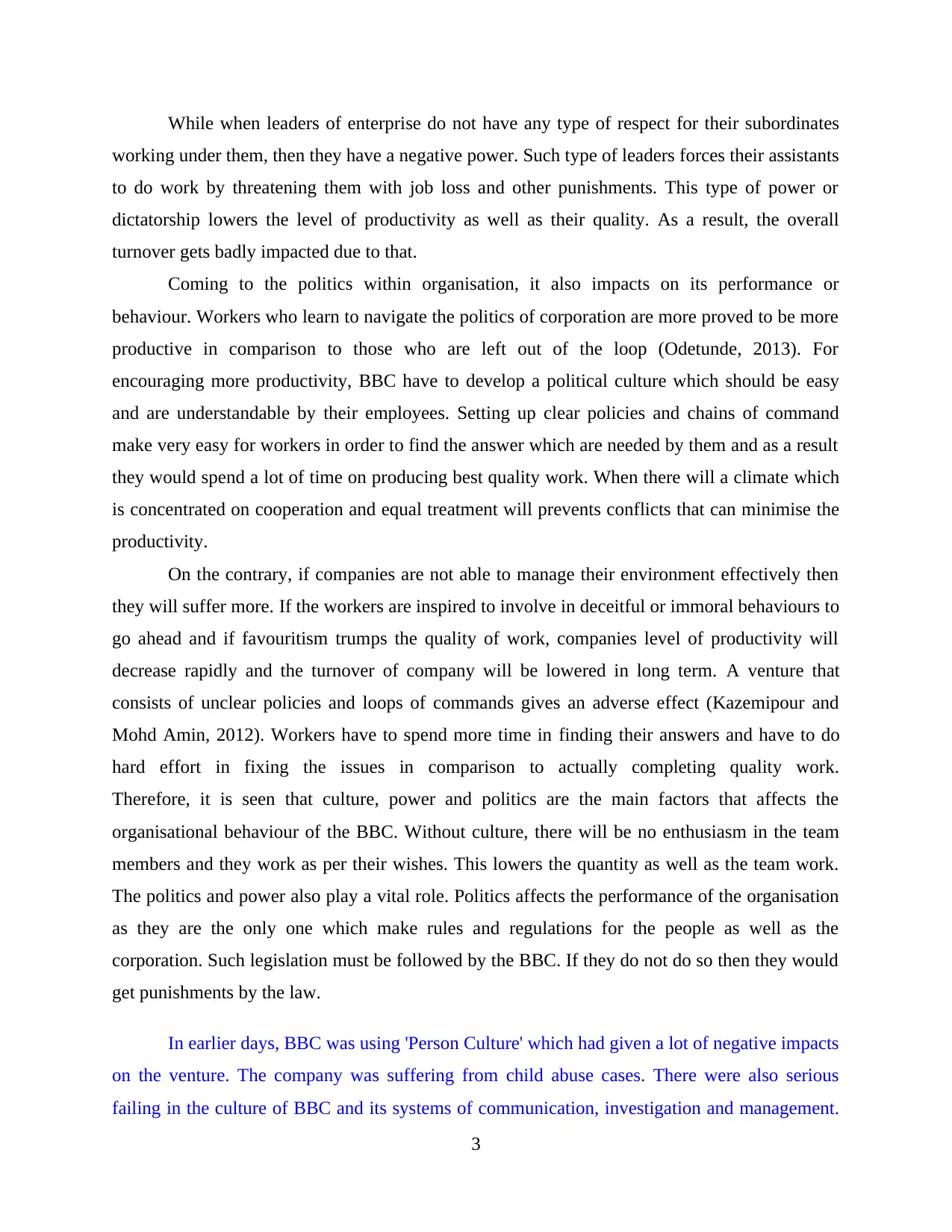
While when leaders of enterprise do not have any type of respect for their subordinates
working under them, then they have a negative power. Such type of leaders forces their assistants
to do work by threatening them with job loss and other punishments. This type of power or
dictatorship lowers the level of productivity as well as their quality. As a result, the overall
turnover gets badly impacted due to that.
Coming to the politics within organisation, it also impacts on its performance or
behaviour. Workers who learn to navigate the politics of corporation are more proved to be more
productive in comparison to those who are left out of the loop (Odetunde, 2013). For
encouraging more productivity, BBC have to develop a political culture which should be easy
and are understandable by their employees. Setting up clear policies and chains of command
make very easy for workers in order to find the answer which are needed by them and as a result
they would spend a lot of time on producing best quality work. When there will a climate which
is concentrated on cooperation and equal treatment will prevents conflicts that can minimise the
productivity.
On the contrary, if companies are not able to manage their environment effectively then
they will suffer more. If the workers are inspired to involve in deceitful or immoral behaviours to
go ahead and if favouritism trumps the quality of work, companies level of productivity will
decrease rapidly and the turnover of company will be lowered in long term. A venture that
consists of unclear policies and loops of commands gives an adverse effect (Kazemipour and
Mohd Amin, 2012). Workers have to spend more time in finding their answers and have to do
hard effort in fixing the issues in comparison to actually completing quality work.
Therefore, it is seen that culture, power and politics are the main factors that affects the
organisational behaviour of the BBC. Without culture, there will be no enthusiasm in the team
members and they work as per their wishes. This lowers the quantity as well as the team work.
The politics and power also play a vital role. Politics affects the performance of the organisation
as they are the only one which make rules and regulations for the people as well as the
corporation. Such legislation must be followed by the BBC. If they do not do so then they would
get punishments by the law.
In earlier days, BBC was using 'Person Culture' which had given a lot of negative impacts
on the venture. The company was suffering from child abuse cases. There were also serious
failing in the culture of BBC and its systems of communication, investigation and management.
3
working under them, then they have a negative power. Such type of leaders forces their assistants
to do work by threatening them with job loss and other punishments. This type of power or
dictatorship lowers the level of productivity as well as their quality. As a result, the overall
turnover gets badly impacted due to that.
Coming to the politics within organisation, it also impacts on its performance or
behaviour. Workers who learn to navigate the politics of corporation are more proved to be more
productive in comparison to those who are left out of the loop (Odetunde, 2013). For
encouraging more productivity, BBC have to develop a political culture which should be easy
and are understandable by their employees. Setting up clear policies and chains of command
make very easy for workers in order to find the answer which are needed by them and as a result
they would spend a lot of time on producing best quality work. When there will a climate which
is concentrated on cooperation and equal treatment will prevents conflicts that can minimise the
productivity.
On the contrary, if companies are not able to manage their environment effectively then
they will suffer more. If the workers are inspired to involve in deceitful or immoral behaviours to
go ahead and if favouritism trumps the quality of work, companies level of productivity will
decrease rapidly and the turnover of company will be lowered in long term. A venture that
consists of unclear policies and loops of commands gives an adverse effect (Kazemipour and
Mohd Amin, 2012). Workers have to spend more time in finding their answers and have to do
hard effort in fixing the issues in comparison to actually completing quality work.
Therefore, it is seen that culture, power and politics are the main factors that affects the
organisational behaviour of the BBC. Without culture, there will be no enthusiasm in the team
members and they work as per their wishes. This lowers the quantity as well as the team work.
The politics and power also play a vital role. Politics affects the performance of the organisation
as they are the only one which make rules and regulations for the people as well as the
corporation. Such legislation must be followed by the BBC. If they do not do so then they would
get punishments by the law.
In earlier days, BBC was using 'Person Culture' which had given a lot of negative impacts
on the venture. The company was suffering from child abuse cases. There were also serious
failing in the culture of BBC and its systems of communication, investigation and management.
3
⊘ This is a preview!⊘
Do you want full access?
Subscribe today to unlock all pages.

Trusted by 1+ million students worldwide
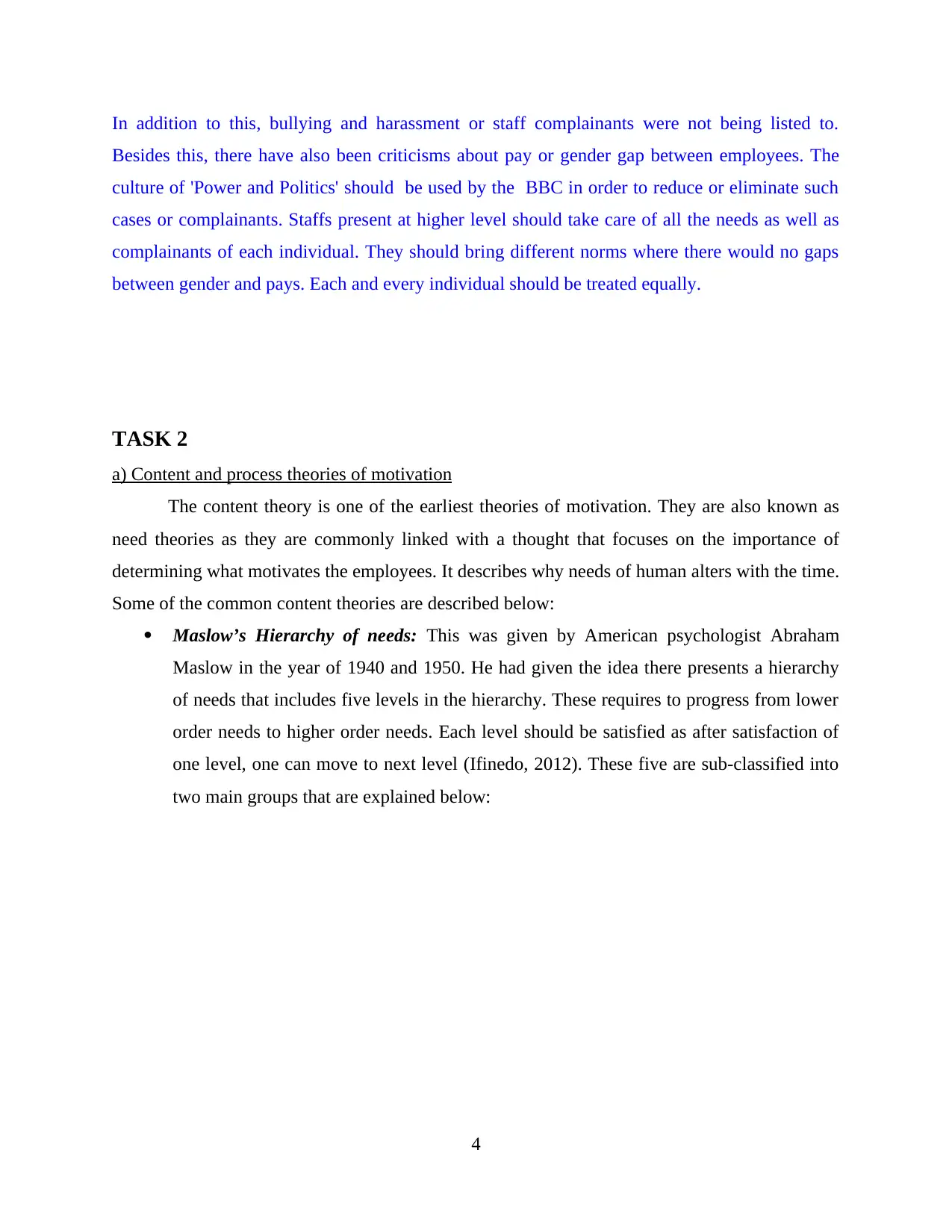
In addition to this, bullying and harassment or staff complainants were not being listed to.
Besides this, there have also been criticisms about pay or gender gap between employees. The
culture of 'Power and Politics' should be used by the BBC in order to reduce or eliminate such
cases or complainants. Staffs present at higher level should take care of all the needs as well as
complainants of each individual. They should bring different norms where there would no gaps
between gender and pays. Each and every individual should be treated equally.
TASK 2
a) Content and process theories of motivation
The content theory is one of the earliest theories of motivation. They are also known as
need theories as they are commonly linked with a thought that focuses on the importance of
determining what motivates the employees. It describes why needs of human alters with the time.
Some of the common content theories are described below:
Maslow’s Hierarchy of needs: This was given by American psychologist Abraham
Maslow in the year of 1940 and 1950. He had given the idea there presents a hierarchy
of needs that includes five levels in the hierarchy. These requires to progress from lower
order needs to higher order needs. Each level should be satisfied as after satisfaction of
one level, one can move to next level (Ifinedo, 2012). These five are sub-classified into
two main groups that are explained below:
4
Besides this, there have also been criticisms about pay or gender gap between employees. The
culture of 'Power and Politics' should be used by the BBC in order to reduce or eliminate such
cases or complainants. Staffs present at higher level should take care of all the needs as well as
complainants of each individual. They should bring different norms where there would no gaps
between gender and pays. Each and every individual should be treated equally.
TASK 2
a) Content and process theories of motivation
The content theory is one of the earliest theories of motivation. They are also known as
need theories as they are commonly linked with a thought that focuses on the importance of
determining what motivates the employees. It describes why needs of human alters with the time.
Some of the common content theories are described below:
Maslow’s Hierarchy of needs: This was given by American psychologist Abraham
Maslow in the year of 1940 and 1950. He had given the idea there presents a hierarchy
of needs that includes five levels in the hierarchy. These requires to progress from lower
order needs to higher order needs. Each level should be satisfied as after satisfaction of
one level, one can move to next level (Ifinedo, 2012). These five are sub-classified into
two main groups that are explained below:
4
Paraphrase This Document
Need a fresh take? Get an instant paraphrase of this document with our AI Paraphraser
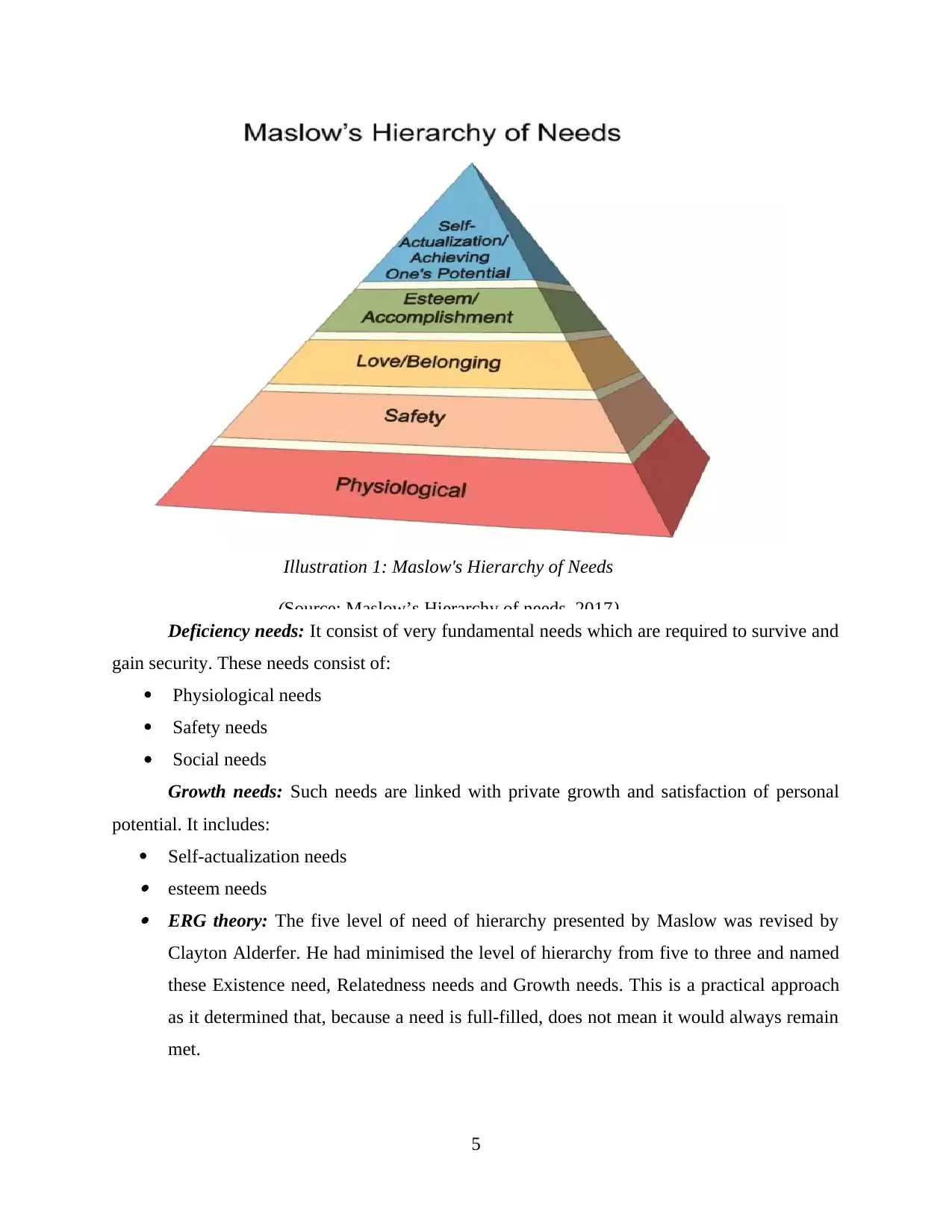
Illustration 1: Maslow's Hierarchy of Needs
(Source: Maslow’s Hierarchy of needs, 2017)
Deficiency needs: It consist of very fundamental needs which are required to survive and
gain security. These needs consist of:
Physiological needs
Safety needs
Social needs
Growth needs: Such needs are linked with private growth and satisfaction of personal
potential. It includes:
Self-actualization needs esteem needs ERG theory: The five level of need of hierarchy presented by Maslow was revised by
Clayton Alderfer. He had minimised the level of hierarchy from five to three and named
these Existence need, Relatedness needs and Growth needs. This is a practical approach
as it determined that, because a need is full-filled, does not mean it would always remain
met.
5
(Source: Maslow’s Hierarchy of needs, 2017)
Deficiency needs: It consist of very fundamental needs which are required to survive and
gain security. These needs consist of:
Physiological needs
Safety needs
Social needs
Growth needs: Such needs are linked with private growth and satisfaction of personal
potential. It includes:
Self-actualization needs esteem needs ERG theory: The five level of need of hierarchy presented by Maslow was revised by
Clayton Alderfer. He had minimised the level of hierarchy from five to three and named
these Existence need, Relatedness needs and Growth needs. This is a practical approach
as it determined that, because a need is full-filled, does not mean it would always remain
met.
5
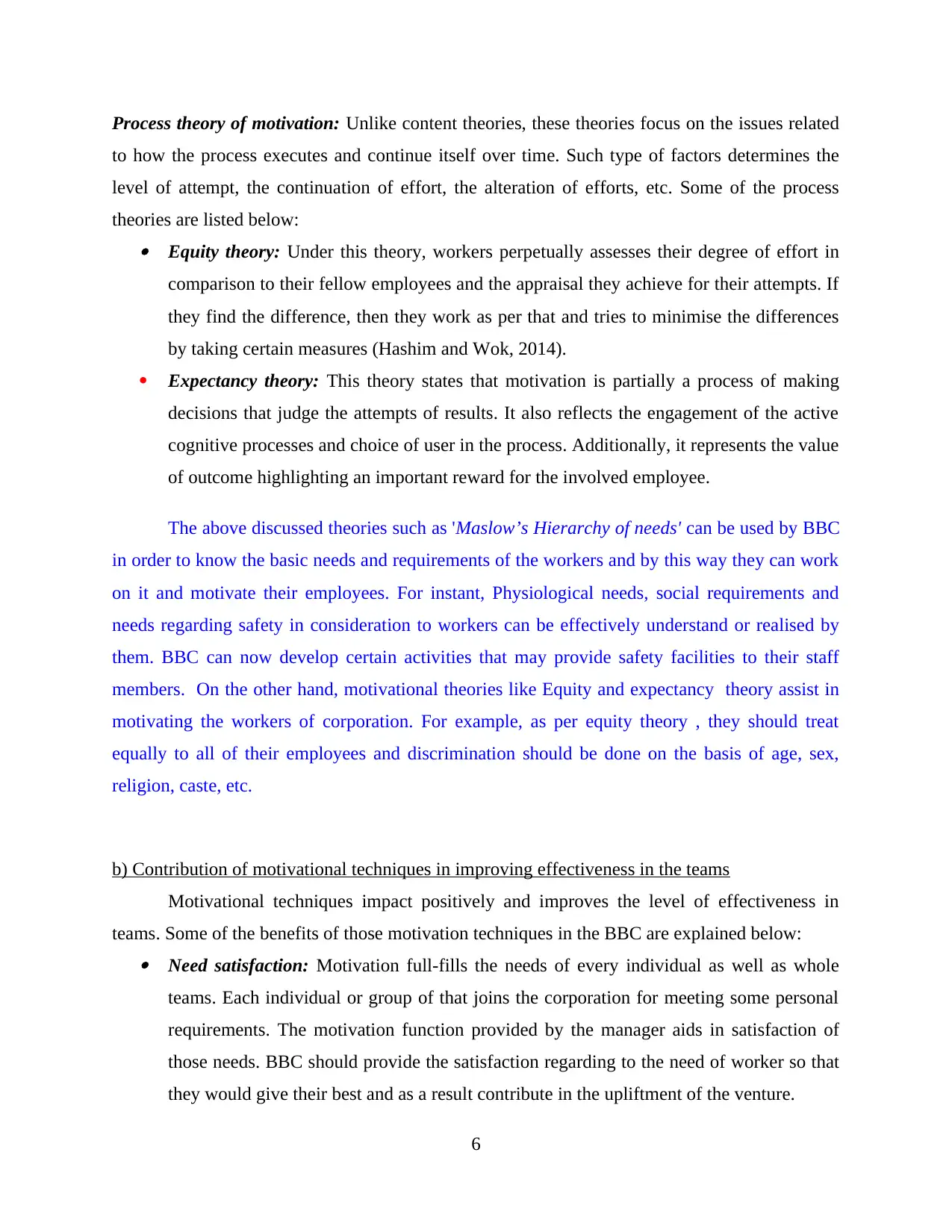
Process theory of motivation: Unlike content theories, these theories focus on the issues related
to how the process executes and continue itself over time. Such type of factors determines the
level of attempt, the continuation of effort, the alteration of efforts, etc. Some of the process
theories are listed below: Equity theory: Under this theory, workers perpetually assesses their degree of effort in
comparison to their fellow employees and the appraisal they achieve for their attempts. If
they find the difference, then they work as per that and tries to minimise the differences
by taking certain measures (Hashim and Wok, 2014).
Expectancy theory: This theory states that motivation is partially a process of making
decisions that judge the attempts of results. It also reflects the engagement of the active
cognitive processes and choice of user in the process. Additionally, it represents the value
of outcome highlighting an important reward for the involved employee.
The above discussed theories such as 'Maslow’s Hierarchy of needs' can be used by BBC
in order to know the basic needs and requirements of the workers and by this way they can work
on it and motivate their employees. For instant, Physiological needs, social requirements and
needs regarding safety in consideration to workers can be effectively understand or realised by
them. BBC can now develop certain activities that may provide safety facilities to their staff
members. On the other hand, motivational theories like Equity and expectancy theory assist in
motivating the workers of corporation. For example, as per equity theory , they should treat
equally to all of their employees and discrimination should be done on the basis of age, sex,
religion, caste, etc.
b) Contribution of motivational techniques in improving effectiveness in the teams
Motivational techniques impact positively and improves the level of effectiveness in
teams. Some of the benefits of those motivation techniques in the BBC are explained below: Need satisfaction: Motivation full-fills the needs of every individual as well as whole
teams. Each individual or group of that joins the corporation for meeting some personal
requirements. The motivation function provided by the manager aids in satisfaction of
those needs. BBC should provide the satisfaction regarding to the need of worker so that
they would give their best and as a result contribute in the upliftment of the venture.
6
to how the process executes and continue itself over time. Such type of factors determines the
level of attempt, the continuation of effort, the alteration of efforts, etc. Some of the process
theories are listed below: Equity theory: Under this theory, workers perpetually assesses their degree of effort in
comparison to their fellow employees and the appraisal they achieve for their attempts. If
they find the difference, then they work as per that and tries to minimise the differences
by taking certain measures (Hashim and Wok, 2014).
Expectancy theory: This theory states that motivation is partially a process of making
decisions that judge the attempts of results. It also reflects the engagement of the active
cognitive processes and choice of user in the process. Additionally, it represents the value
of outcome highlighting an important reward for the involved employee.
The above discussed theories such as 'Maslow’s Hierarchy of needs' can be used by BBC
in order to know the basic needs and requirements of the workers and by this way they can work
on it and motivate their employees. For instant, Physiological needs, social requirements and
needs regarding safety in consideration to workers can be effectively understand or realised by
them. BBC can now develop certain activities that may provide safety facilities to their staff
members. On the other hand, motivational theories like Equity and expectancy theory assist in
motivating the workers of corporation. For example, as per equity theory , they should treat
equally to all of their employees and discrimination should be done on the basis of age, sex,
religion, caste, etc.
b) Contribution of motivational techniques in improving effectiveness in the teams
Motivational techniques impact positively and improves the level of effectiveness in
teams. Some of the benefits of those motivation techniques in the BBC are explained below: Need satisfaction: Motivation full-fills the needs of every individual as well as whole
teams. Each individual or group of that joins the corporation for meeting some personal
requirements. The motivation function provided by the manager aids in satisfaction of
those needs. BBC should provide the satisfaction regarding to the need of worker so that
they would give their best and as a result contribute in the upliftment of the venture.
6
⊘ This is a preview!⊘
Do you want full access?
Subscribe today to unlock all pages.

Trusted by 1+ million students worldwide
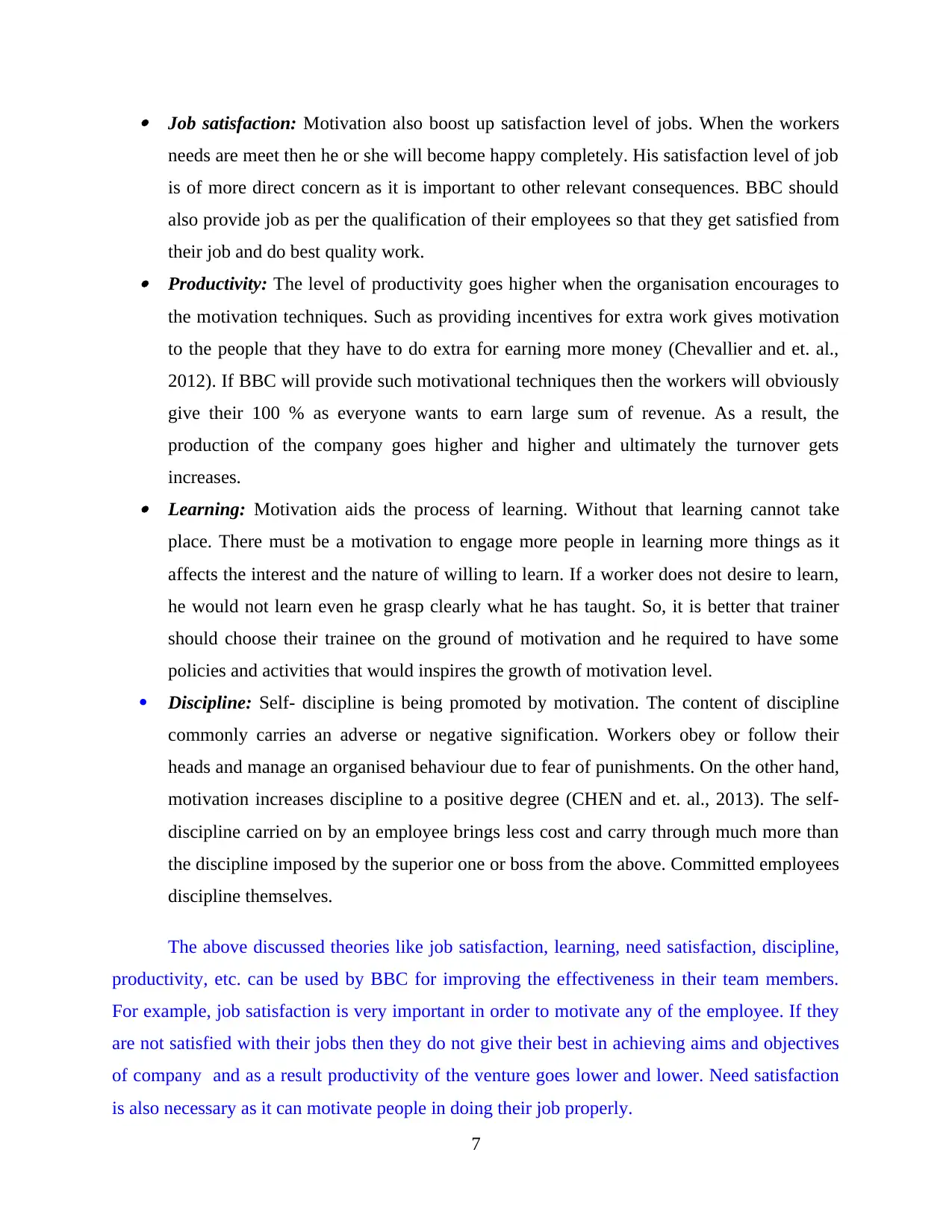
Job satisfaction: Motivation also boost up satisfaction level of jobs. When the workers
needs are meet then he or she will become happy completely. His satisfaction level of job
is of more direct concern as it is important to other relevant consequences. BBC should
also provide job as per the qualification of their employees so that they get satisfied from
their job and do best quality work. Productivity: The level of productivity goes higher when the organisation encourages to
the motivation techniques. Such as providing incentives for extra work gives motivation
to the people that they have to do extra for earning more money (Chevallier and et. al.,
2012). If BBC will provide such motivational techniques then the workers will obviously
give their 100 % as everyone wants to earn large sum of revenue. As a result, the
production of the company goes higher and higher and ultimately the turnover gets
increases. Learning: Motivation aids the process of learning. Without that learning cannot take
place. There must be a motivation to engage more people in learning more things as it
affects the interest and the nature of willing to learn. If a worker does not desire to learn,
he would not learn even he grasp clearly what he has taught. So, it is better that trainer
should choose their trainee on the ground of motivation and he required to have some
policies and activities that would inspires the growth of motivation level.
Discipline: Self- discipline is being promoted by motivation. The content of discipline
commonly carries an adverse or negative signification. Workers obey or follow their
heads and manage an organised behaviour due to fear of punishments. On the other hand,
motivation increases discipline to a positive degree (CHEN and et. al., 2013). The self-
discipline carried on by an employee brings less cost and carry through much more than
the discipline imposed by the superior one or boss from the above. Committed employees
discipline themselves.
The above discussed theories like job satisfaction, learning, need satisfaction, discipline,
productivity, etc. can be used by BBC for improving the effectiveness in their team members.
For example, job satisfaction is very important in order to motivate any of the employee. If they
are not satisfied with their jobs then they do not give their best in achieving aims and objectives
of company and as a result productivity of the venture goes lower and lower. Need satisfaction
is also necessary as it can motivate people in doing their job properly.
7
needs are meet then he or she will become happy completely. His satisfaction level of job
is of more direct concern as it is important to other relevant consequences. BBC should
also provide job as per the qualification of their employees so that they get satisfied from
their job and do best quality work. Productivity: The level of productivity goes higher when the organisation encourages to
the motivation techniques. Such as providing incentives for extra work gives motivation
to the people that they have to do extra for earning more money (Chevallier and et. al.,
2012). If BBC will provide such motivational techniques then the workers will obviously
give their 100 % as everyone wants to earn large sum of revenue. As a result, the
production of the company goes higher and higher and ultimately the turnover gets
increases. Learning: Motivation aids the process of learning. Without that learning cannot take
place. There must be a motivation to engage more people in learning more things as it
affects the interest and the nature of willing to learn. If a worker does not desire to learn,
he would not learn even he grasp clearly what he has taught. So, it is better that trainer
should choose their trainee on the ground of motivation and he required to have some
policies and activities that would inspires the growth of motivation level.
Discipline: Self- discipline is being promoted by motivation. The content of discipline
commonly carries an adverse or negative signification. Workers obey or follow their
heads and manage an organised behaviour due to fear of punishments. On the other hand,
motivation increases discipline to a positive degree (CHEN and et. al., 2013). The self-
discipline carried on by an employee brings less cost and carry through much more than
the discipline imposed by the superior one or boss from the above. Committed employees
discipline themselves.
The above discussed theories like job satisfaction, learning, need satisfaction, discipline,
productivity, etc. can be used by BBC for improving the effectiveness in their team members.
For example, job satisfaction is very important in order to motivate any of the employee. If they
are not satisfied with their jobs then they do not give their best in achieving aims and objectives
of company and as a result productivity of the venture goes lower and lower. Need satisfaction
is also necessary as it can motivate people in doing their job properly.
7
Paraphrase This Document
Need a fresh take? Get an instant paraphrase of this document with our AI Paraphraser
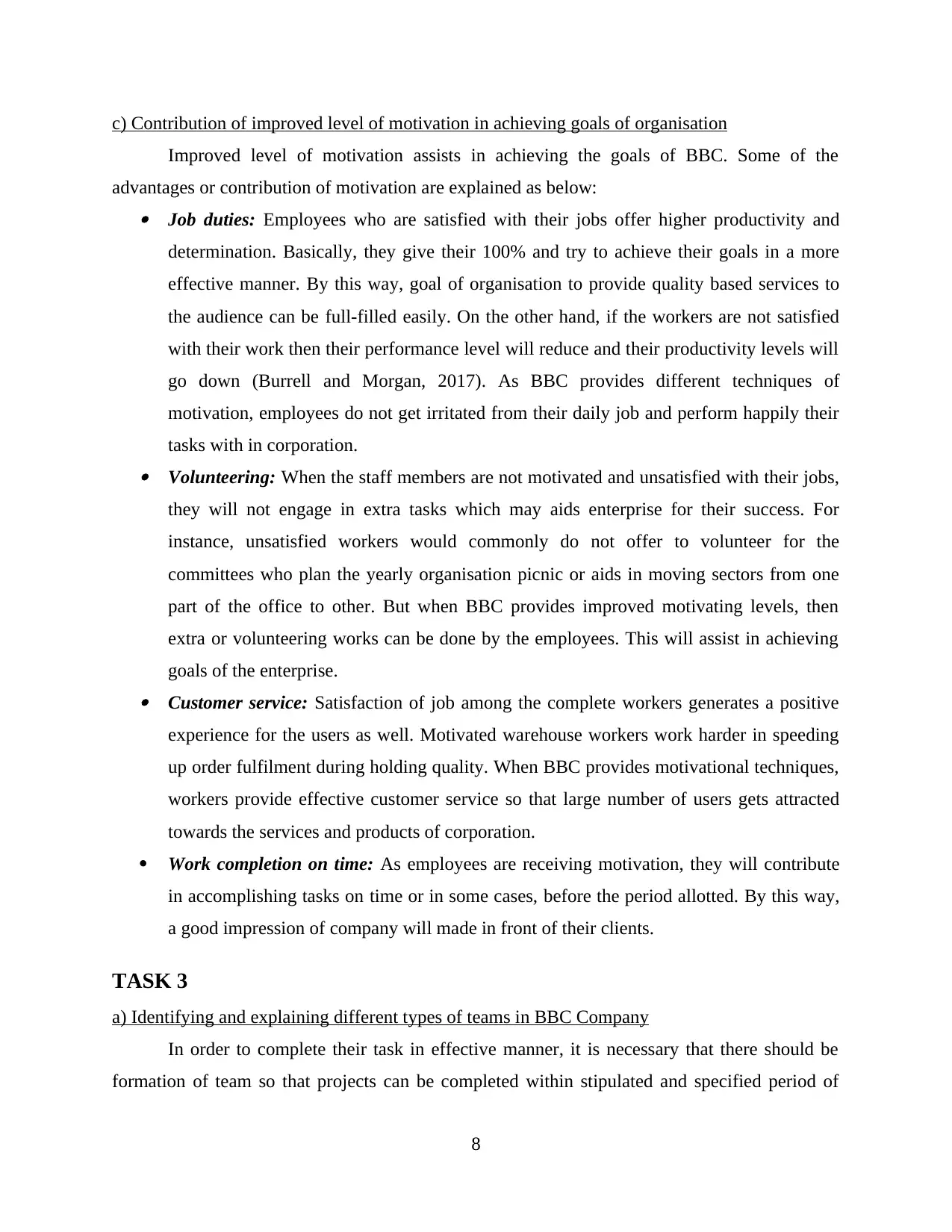
c) Contribution of improved level of motivation in achieving goals of organisation
Improved level of motivation assists in achieving the goals of BBC. Some of the
advantages or contribution of motivation are explained as below: Job duties: Employees who are satisfied with their jobs offer higher productivity and
determination. Basically, they give their 100% and try to achieve their goals in a more
effective manner. By this way, goal of organisation to provide quality based services to
the audience can be full-filled easily. On the other hand, if the workers are not satisfied
with their work then their performance level will reduce and their productivity levels will
go down (Burrell and Morgan, 2017). As BBC provides different techniques of
motivation, employees do not get irritated from their daily job and perform happily their
tasks with in corporation. Volunteering: When the staff members are not motivated and unsatisfied with their jobs,
they will not engage in extra tasks which may aids enterprise for their success. For
instance, unsatisfied workers would commonly do not offer to volunteer for the
committees who plan the yearly organisation picnic or aids in moving sectors from one
part of the office to other. But when BBC provides improved motivating levels, then
extra or volunteering works can be done by the employees. This will assist in achieving
goals of the enterprise. Customer service: Satisfaction of job among the complete workers generates a positive
experience for the users as well. Motivated warehouse workers work harder in speeding
up order fulfilment during holding quality. When BBC provides motivational techniques,
workers provide effective customer service so that large number of users gets attracted
towards the services and products of corporation.
Work completion on time: As employees are receiving motivation, they will contribute
in accomplishing tasks on time or in some cases, before the period allotted. By this way,
a good impression of company will made in front of their clients.
TASK 3
a) Identifying and explaining different types of teams in BBC Company
In order to complete their task in effective manner, it is necessary that there should be
formation of team so that projects can be completed within stipulated and specified period of
8
Improved level of motivation assists in achieving the goals of BBC. Some of the
advantages or contribution of motivation are explained as below: Job duties: Employees who are satisfied with their jobs offer higher productivity and
determination. Basically, they give their 100% and try to achieve their goals in a more
effective manner. By this way, goal of organisation to provide quality based services to
the audience can be full-filled easily. On the other hand, if the workers are not satisfied
with their work then their performance level will reduce and their productivity levels will
go down (Burrell and Morgan, 2017). As BBC provides different techniques of
motivation, employees do not get irritated from their daily job and perform happily their
tasks with in corporation. Volunteering: When the staff members are not motivated and unsatisfied with their jobs,
they will not engage in extra tasks which may aids enterprise for their success. For
instance, unsatisfied workers would commonly do not offer to volunteer for the
committees who plan the yearly organisation picnic or aids in moving sectors from one
part of the office to other. But when BBC provides improved motivating levels, then
extra or volunteering works can be done by the employees. This will assist in achieving
goals of the enterprise. Customer service: Satisfaction of job among the complete workers generates a positive
experience for the users as well. Motivated warehouse workers work harder in speeding
up order fulfilment during holding quality. When BBC provides motivational techniques,
workers provide effective customer service so that large number of users gets attracted
towards the services and products of corporation.
Work completion on time: As employees are receiving motivation, they will contribute
in accomplishing tasks on time or in some cases, before the period allotted. By this way,
a good impression of company will made in front of their clients.
TASK 3
a) Identifying and explaining different types of teams in BBC Company
In order to complete their task in effective manner, it is necessary that there should be
formation of team so that projects can be completed within stipulated and specified period of
8
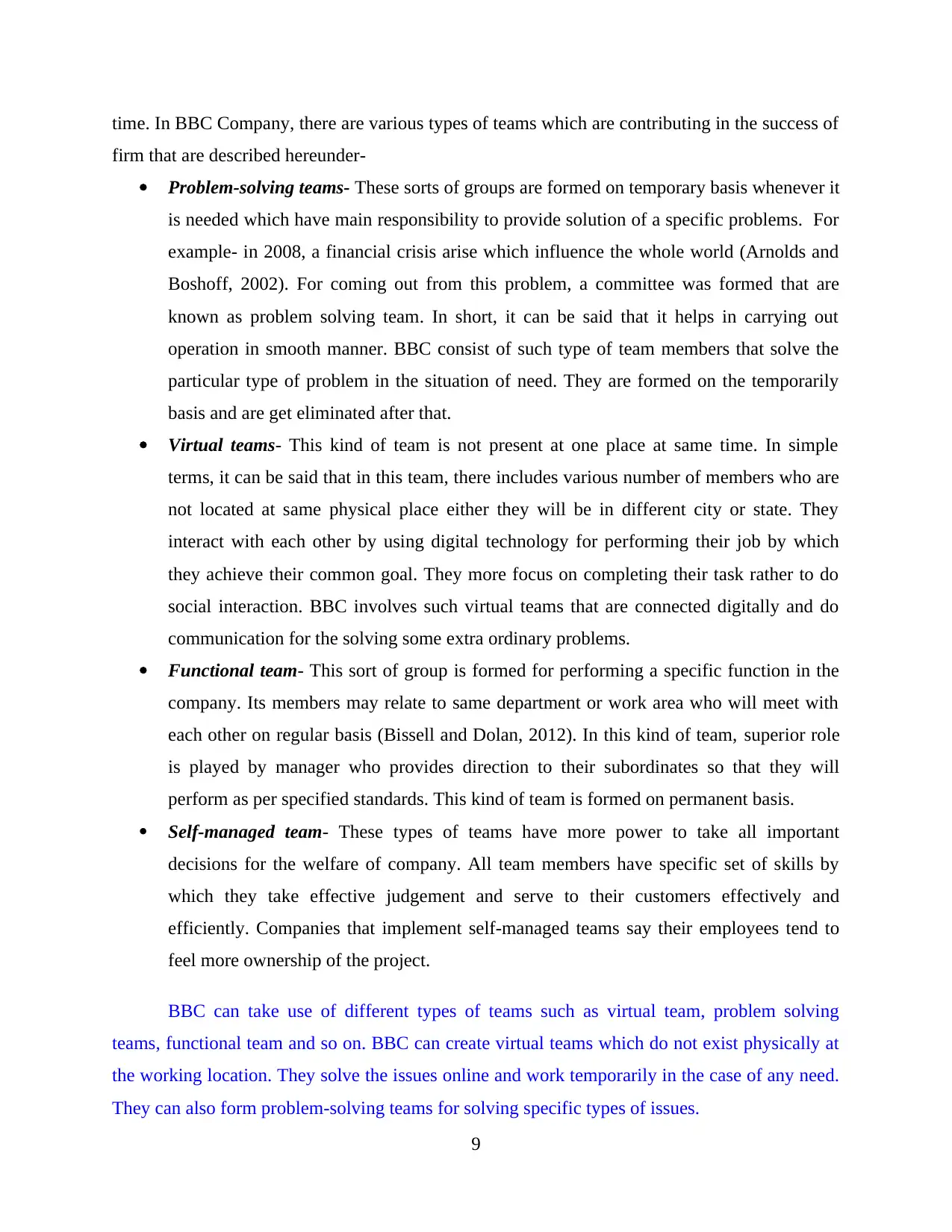
time. In BBC Company, there are various types of teams which are contributing in the success of
firm that are described hereunder-
Problem-solving teams- These sorts of groups are formed on temporary basis whenever it
is needed which have main responsibility to provide solution of a specific problems. For
example- in 2008, a financial crisis arise which influence the whole world (Arnolds and
Boshoff, 2002). For coming out from this problem, a committee was formed that are
known as problem solving team. In short, it can be said that it helps in carrying out
operation in smooth manner. BBC consist of such type of team members that solve the
particular type of problem in the situation of need. They are formed on the temporarily
basis and are get eliminated after that.
Virtual teams- This kind of team is not present at one place at same time. In simple
terms, it can be said that in this team, there includes various number of members who are
not located at same physical place either they will be in different city or state. They
interact with each other by using digital technology for performing their job by which
they achieve their common goal. They more focus on completing their task rather to do
social interaction. BBC involves such virtual teams that are connected digitally and do
communication for the solving some extra ordinary problems.
Functional team- This sort of group is formed for performing a specific function in the
company. Its members may relate to same department or work area who will meet with
each other on regular basis (Bissell and Dolan, 2012). In this kind of team, superior role
is played by manager who provides direction to their subordinates so that they will
perform as per specified standards. This kind of team is formed on permanent basis.
Self-managed team- These types of teams have more power to take all important
decisions for the welfare of company. All team members have specific set of skills by
which they take effective judgement and serve to their customers effectively and
efficiently. Companies that implement self-managed teams say their employees tend to
feel more ownership of the project.
BBC can take use of different types of teams such as virtual team, problem solving
teams, functional team and so on. BBC can create virtual teams which do not exist physically at
the working location. They solve the issues online and work temporarily in the case of any need.
They can also form problem-solving teams for solving specific types of issues.
9
firm that are described hereunder-
Problem-solving teams- These sorts of groups are formed on temporary basis whenever it
is needed which have main responsibility to provide solution of a specific problems. For
example- in 2008, a financial crisis arise which influence the whole world (Arnolds and
Boshoff, 2002). For coming out from this problem, a committee was formed that are
known as problem solving team. In short, it can be said that it helps in carrying out
operation in smooth manner. BBC consist of such type of team members that solve the
particular type of problem in the situation of need. They are formed on the temporarily
basis and are get eliminated after that.
Virtual teams- This kind of team is not present at one place at same time. In simple
terms, it can be said that in this team, there includes various number of members who are
not located at same physical place either they will be in different city or state. They
interact with each other by using digital technology for performing their job by which
they achieve their common goal. They more focus on completing their task rather to do
social interaction. BBC involves such virtual teams that are connected digitally and do
communication for the solving some extra ordinary problems.
Functional team- This sort of group is formed for performing a specific function in the
company. Its members may relate to same department or work area who will meet with
each other on regular basis (Bissell and Dolan, 2012). In this kind of team, superior role
is played by manager who provides direction to their subordinates so that they will
perform as per specified standards. This kind of team is formed on permanent basis.
Self-managed team- These types of teams have more power to take all important
decisions for the welfare of company. All team members have specific set of skills by
which they take effective judgement and serve to their customers effectively and
efficiently. Companies that implement self-managed teams say their employees tend to
feel more ownership of the project.
BBC can take use of different types of teams such as virtual team, problem solving
teams, functional team and so on. BBC can create virtual teams which do not exist physically at
the working location. They solve the issues online and work temporarily in the case of any need.
They can also form problem-solving teams for solving specific types of issues.
9
⊘ This is a preview!⊘
Do you want full access?
Subscribe today to unlock all pages.

Trusted by 1+ million students worldwide
1 out of 18
Related Documents
Your All-in-One AI-Powered Toolkit for Academic Success.
+13062052269
info@desklib.com
Available 24*7 on WhatsApp / Email
![[object Object]](/_next/static/media/star-bottom.7253800d.svg)
Unlock your academic potential
Copyright © 2020–2026 A2Z Services. All Rights Reserved. Developed and managed by ZUCOL.





